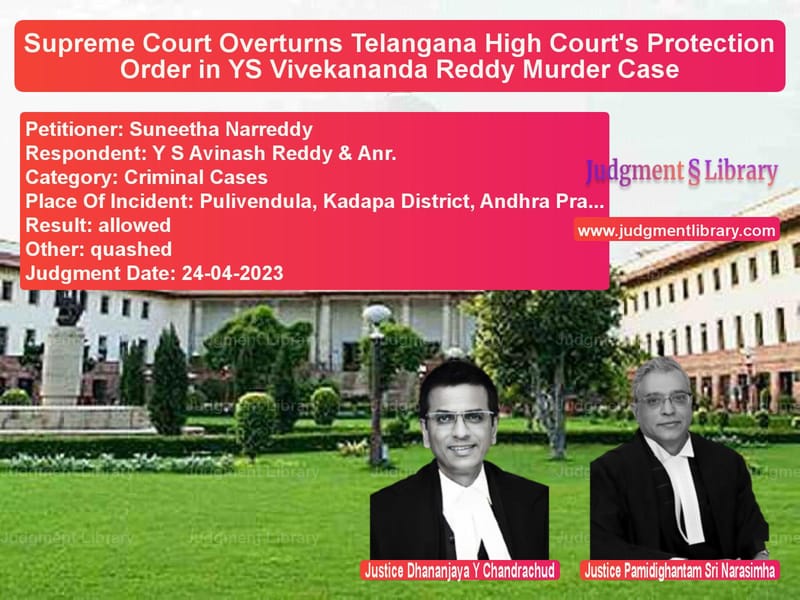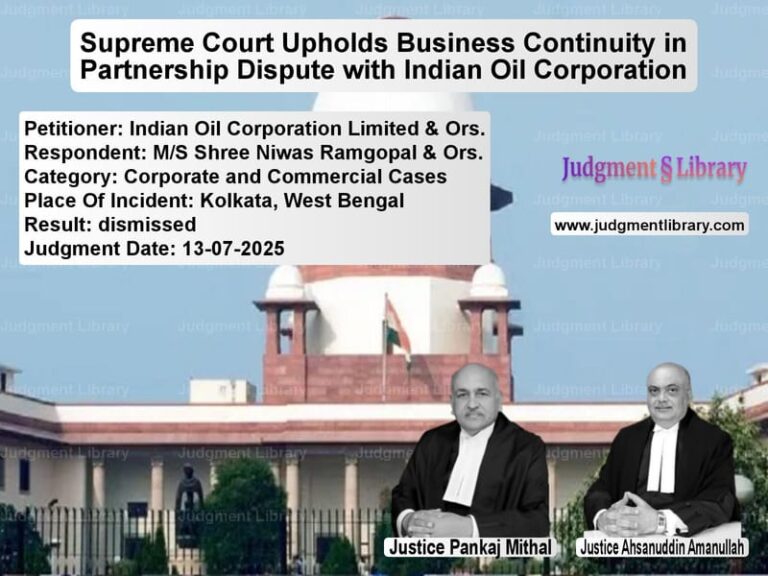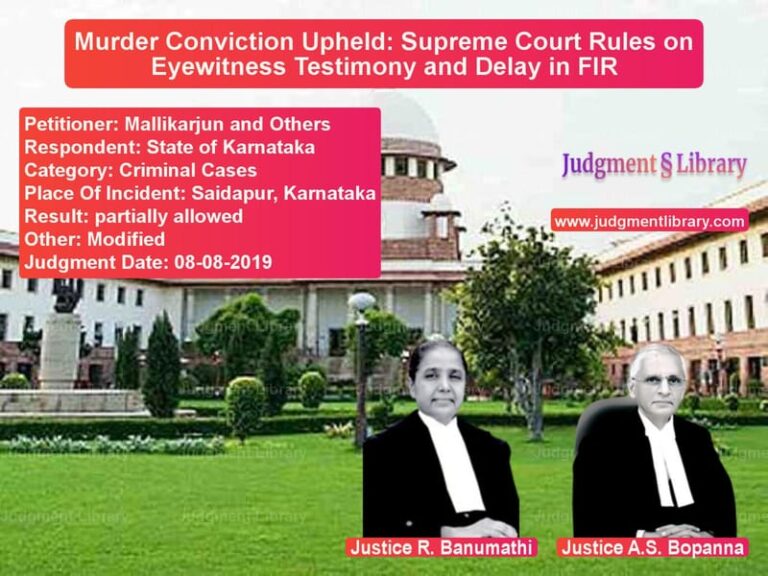Supreme Court Overturns Telangana High Court’s Protection Order in YS Vivekananda Reddy Murder Case
The Supreme Court of India recently delivered a significant ruling in the case of Suneetha Narreddy vs. YS Avinash Reddy & Anr., which pertains to the high-profile murder of YS Vivekananda Reddy, former Member of Parliament and brother of the late Chief Minister of Andhra Pradesh, YS Rajasekhara Reddy. The case focused on the anticipatory bail application of YS Avinash Reddy, a suspect in the conspiracy behind the murder.
Background of the Case
YS Vivekananda Reddy was found murdered at his residence in Pulivendula, Kadapa district, Andhra Pradesh, on the intervening night of March 14-15, 2019. Initially investigated by a Special Investigating Team (SIT) of the Andhra Pradesh police, the case was later transferred to the Central Bureau of Investigation (CBI) following a petition filed by Suneetha Narreddy, the deceased’s daughter.
The CBI, after multiple summons and arrests, identified several individuals involved in the conspiracy, including YS Avinash Reddy. The agency alleged that the crime scene was tampered with, and efforts were made to mislead the investigation. As the investigation progressed, YS Avinash Reddy sought anticipatory bail from the Telangana High Court.
High Court’s Protection Order
The Telangana High Court, on April 18, 2023, granted interim protection to YS Avinash Reddy, directing that:
- He should appear before the CBI between April 19 and 25, 2023.
- His interrogation should be conducted in written format with a questionnaire.
- He should not be arrested during this period.
Following this order, Suneetha Narreddy moved the Supreme Court, arguing that such protections would hinder the ongoing investigation and shield a key suspect from proper questioning.
Arguments of the Petitioner
Senior Advocate Sidharth Luthra, appearing for the petitioner, contended:
- The High Court’s order compromised the CBI’s ability to conduct a fair and thorough investigation.
- The imposition of a written format for questioning was unprecedented and unjustified.
- The case involved a high-profile murder with strong political ramifications, necessitating free and unhindered interrogation of all suspects.
- Multiple witness statements implicated YS Avinash Reddy in the conspiracy, particularly in tampering with the crime scene.
Arguments of the Respondent
Senior Advocates Mukul Rohatgi and Ranjit Kumar, representing YS Avinash Reddy, argued:
- There was no direct evidence linking their client to the crime.
- The CBI had already questioned him multiple times, and there was no need for custodial interrogation.
- Political motivations were influencing the investigation, and undue pressure was being exerted on law enforcement agencies.
- The protection granted by the High Court was necessary to prevent harassment and safeguard fundamental rights.
Supreme Court’s Observations
The Supreme Court bench, comprising Chief Justice Dhananjaya Y Chandrachud and Justice Pamidighantam Sri Narasimha, made the following key observations:
- “The High Court’s order stultifies the investigation. There is absolutely no warrant for directing that a suspect’s interrogation should be in written form.”
- “Such directions by the High Court prejudice the course of investigation and are wholly inappropriate, particularly in a case involving a serious crime.”
- “Given the nature of the allegations, the CBI must be allowed to interrogate the suspect freely and without constraints.”
- “The investigation into the murder is still ongoing, and such judicial interference hampers the ability of law enforcement to uncover the truth.”
Final Judgment
The Supreme Court set aside the Telangana High Court’s order and ruled:
- The protection from arrest granted to YS Avinash Reddy was revoked.
- The CBI was free to conduct his interrogation without restrictions.
- The agency was given an extension until June 30, 2023, to complete the investigation.
Implications of the Judgment
This ruling has significant implications for high-profile criminal investigations:
- Judicial Restraint in Criminal Investigations: The Supreme Court reaffirmed that courts should not unduly interfere with active criminal probes.
- Unfettered Investigative Powers: The decision empowers investigating agencies to conduct interrogations without arbitrary judicial constraints.
- Precedent for Future Cases: The judgment sets a precedent for handling anticipatory bail applications in sensitive cases.
Conclusion
The Supreme Court’s ruling in Suneetha Narreddy vs. YS Avinash Reddy & Anr. marks a crucial moment in criminal jurisprudence, ensuring that high-profile suspects do not receive undue judicial protection that could hinder investigations. By allowing the CBI to proceed without constraints, the judgment upholds the principle that all individuals, regardless of status, must be subject to a fair and transparent investigative process.
Petitioner Name: Suneetha Narreddy.Respondent Name: Y S Avinash Reddy & Anr..Judgment By: Justice Dhananjaya Y Chandrachud, Justice Pamidighantam Sri Narasimha.Place Of Incident: Pulivendula, Kadapa District, Andhra Pradesh.Judgment Date: 24-04-2023.
Don’t miss out on the full details! Download the complete judgment in PDF format below and gain valuable insights instantly!
Download Judgment: suneetha-narreddy-vs-y-s-avinash-reddy-&-supreme-court-of-india-judgment-dated-24-04-2023.pdf
Directly Download Judgment: Directly download this Judgment
See all petitions in Bail and Anticipatory Bail
See all petitions in Custodial Deaths and Police Misconduct
See all petitions in Judgment by Dhananjaya Y Chandrachud
See all petitions in Judgment by P.S. Narasimha
See all petitions in allowed
See all petitions in Quashed
See all petitions in supreme court of India judgments April 2023
See all petitions in 2023 judgments
See all posts in Criminal Cases Category
See all allowed petitions in Criminal Cases Category
See all Dismissed petitions in Criminal Cases Category
See all partially allowed petitions in Criminal Cases Category







